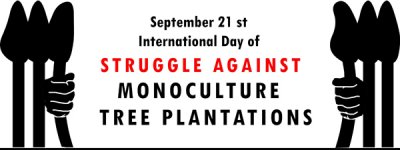- Internacional:
International Declaration 21 September 201519 de Septiembre de 2015
International Day of Struggle against Monoculture Tree Plantations
Among all of the main monoculture tree plantations for industrial use such as eucalyptus, pine, rubber, acacia and also oil palm trees, promoted in many countries and continents, industrial oil palm plantations are those that have expanded fastest in the past few decades. Just in the period 1990-2010, industrial oil palm plantations expanded globally about threefold, especially in Indonesia and Malaysia.
Not long ago, national markets for vegetable oils were dominated by local sources of oils and fats – including palm oil in many African countries – and national policies and regulations protected domestic vegetable oil producers from cheap imports. But, over the past 15 years, a series of free trade agreements have removed most of these protections in many countries, opening the flood gates for the cheapest source. Right now, that is oil palm. This is driving the latest expansion trend of industrial oil palm plantations, not only in Indonesia and Malaysia but also in those countries in Africa and Latin America, close to the equator with the climatic conditions to grow oil palm. Another trend that promotes expansion comes especially from Europe with the increasing agrofuel demand. The exponential expansion of industrial oil palm plantations has come at a very high price: a growing number of economic, social, cultural and environmental impacts, including major biodiversity loss, that affect communities in the expansion countries and regions.
After the Roundtable on Sustainable Palm Oil (RSPO) certification scheme, which provides the false promise of “sustainability” for products from industrial oil palm plantations, and other newer certification-like schemes promoted especially in Indonesia, the most recent trend of “corporate responsibility” policy in the oil palm sector is the commitment to a so-called “zero deforestation” policy. The biggest players in a sector dominated by transnational corporations (TNCs) and big financial institutions have already made such “zero deforestation” pledges, promoted also by big conservation NGOs collaborating closely with the TNCs of the sector. However, these are voluntary commitments, rather than binding rules. Secondly, and maybe more importantly, reports from the ground already show that there are plenty of denunciations about environmental and social violations of the companies after undertaking these commitments. One example is that of Wilmar and its actions in Uganda, where the expansion of its oil palm plantations led to the displacement of peasant farmers. What is maybe most disturbing about these “commitments” published by palm oil corporations is the fact that the objective is not about halting industrial oil palm expansion. Worse still, these pledges suggest that deforestation is the main and only problem with industrial oil palm plantations.

Of course, industrial oil palm and tree plantation expansion in general are responsible for millions of hectares of deforestation. Forests are crucial and deforestation must be halted, also because forests provide livelihoods and are the home to forest-dependent communities. But the interest of corporations – with a profit-driven logic – in protecting forests is not the welfare of local populations or the genuine conservation of habitats and species: crucial for them is the fact that forests and especially trees have become very important under “green capitalism” as a carbon and biodiversity store, a potential source of carbon and biodiversity credits that can be sold to polluting countries and companies. REDD+ and REDD+-like policies that promote financing forest conservation through the sale of carbon and biodiversity credits from forest areas can benefit corporations with access to such areas through concessions or land titles for setting up plantations. Carbon and biodiversity markets can thus channel money to oil palm companies for conservation of those forest areas with a so-called “high carbon value” that big oil palm companies have been identifying in their land concessions through hiring consultants all over the world. But conserving areas with “high carbon value” does not solve the fundamental problems of a sector based on large-scale industrial plantations, requiring significant use of water, agrotoxins, chemical fertilizers and fossil energy, occupying huge areas where many people lived or depend upon and with plans to increase more and more, and therefore it will continue to contribute to climate destruction rather than presenting any real solution to climate change. And who will be most affected by such policies are forest peoples and peasant communities who will see oil palm plantations continue to expand, and their access to their lands and forests increasingly restricted. For them – not responsible at all for the current climate change problem – not only “high carbon value” forest is important, all of the areas they occupy and control are of vital importance for their livelihoods and their future.
Governments of palm oil producing countries, together with the TNCs of the sector, have also been active to appeal for re-categorizing oil palm plantations from being an agricultural crop to being “forests”, both in their own countries but also internationally. According to the prevailing FAO definition, a forest is basically any area with a tree cover. The aim is guaranteeing access to the “opportunity” represented by a potential REDD+ agreement under the UN climate negotiations in Paris by the end of this year to be able to sell carbon credits in the future, using the absurd arguments of promoting “zero net deforestation” or “reforestation”.
Furthermore, the emphasis in deforestation tends to give less attention to the whole range of impacts industrial oil palm plantations cause in many countries, such as:
– Destruction of local livelihoods and displacement. The regions oil palm plantations are being promoted are home for peasants and indigenous peoples and the tropical forests that they depend on for economic, social, spiritual and cultural reasons. Industrial oil palm plantations therefore cause the loss of lands and thus livelihoods of communities, especially for women because of their specific relation with the forest, resulting in displacement of these communities. The almost 20 million hectares nowadays occupied in Latin America, Africa and Asia by industrial oil palm plantations have taken away the perspective of a future from many people who have seen their territories invaded and forests destroyed. This destruction has gravely affected the food sovereignty not only of communities but of entire regions.
– Destructive logging and human rights violations. In many cases, these plantations are also a result of devastating logging in the past that paved the way for the oil palm plantations coming in. Only for Sabah and Sarawak (the two Malaysia states in Borneo), it is estimated that in 2014 the size of oil palm plantations which may involve forest conversions and/or violate indigenous customary land rights stands at 1.1 million hectares for Sarawak and 0.4 million hectares for Sabah, altogether 1.5 million hectares. Moreover, land clearing through burning for developing oil palm plantations in Indonesia has been continuing for more than a decade, resulting in an almost annual haze for Southeast Asia. This practice not only harms the environment, but also the health of millions of citizens.
– Privileged land access for corporations, not communities. Introducing the model of industrial oil palm cultivation in a certain country or area through land concessions guarantees privileged access to agricultural lands for long periods to corporations, increasing their power and influence. In the case of Latin America, it promotes further privatization of lands and land concentration, with the state providing incentives for individual land and property titles, on state land and thus promoting financial speculation. In all cases, struggles for guaranteeing collective rights over territories of communities and a diversified and agro-ecological agriculture controlled by these communities tends to become increasingly harder. The demands from communities are usually not heard by the state governments and international organizations in support of industrial agricultural development. They rather argue that communities will benefit from the oil palm plantations through job creation.
– Miserable working conditions. Jobs turn out to be few and labor conditions hard. Working conditions in oil palm plantations are often akin to slavery, and child labor as well as drugs abuse among workers and prostitution have been documented in numerous instances. Workers are also especially affected by the obligation to apply agrotoxins in the monoculture plantations, including products forbidden in many countries. Given the hard climatic conditions where oil palm can grow – high temperatures -, the use of protective equipment is extremely difficult; but even if such equipment is properly used, testimonies from the ground reveal that workers have no guarantee that they will not be exposed to doses that are a threat to their health. Many become ill for the rest of their lives, without being able to count on any compensation. The situation of workers becomes even worse under the current global economic crisis, where companies seek to maintain their gains by spending even less on what they call “labor costs”.
– Increasing criminalization of social movements and local opposition. A very concerning aspect is also that communities and supporting organizations as well as workers in oil palm plantations have to deal worldwide with an increasing trend of human rights violations including criminalization. In Honduras only, over the past 10 years about 140 people – mainly community people – were killed as a result of the conflicts between communities and oil palm companies. Also in other countries people were killed, arrested and/or persecuted, just because of their struggle of defending the collective rights of communities over their territories and their opposition against the invasion of their territories by industrial oil palm companies. Meanwhile, companies can count on all sorts of protection from security forces of the state such as the police and even the army.
Since 2006, the Day of September 21st has been established as the International Day of Struggle against Tree Monocultures, aiming to increase the visibility of the growing number of peoples and communities, often the most marginalized ones, including the women and youth, who are struggling in different places and countries against industrial oil palm and other monocultures of eucalyptus, pine, acacia and rubber plantations. This Day is a way of breaking the circle of silence around the violations faced by the communities whose territories are invaded and surrounded by these monocultures.
The current attempts of “greening” the industrial oil palm sector and also other large-scale plantations with “zero deforestation” commitments or “improving” it otherwise through certification schemes, such as RSPO and related new schemes, while maintaining the logic of unlimited expansion, is a further threat for more communities to lose their lands and livelihoods. We therefore condemn the large-scale, growth- and export-oriented model that currently drives oil palm expansion globally. There is no way to make large-scale industrial tree monocultures acceptable, neither for local communities nor for a world facing a severe crisis with manifold symptoms, including climate change, economic and environmental deterioration and increasing militarization and human rights violations.
In the countries where industrial oil palm plantations occupy large areas of land, governments should give absolute priority to the demands of the communities, support their control over the lands and forests they depend on rather than adopting policies that facilitate handing these territories over to TNCs. We furthermore urge governments to invest in local diversified food production and food sovereignty, as the best way to support communities and also local and national economies as well as to promote more environmental and social justice.
“Plantations are not Forests!”
– Acción Ecológica, Ecuador
– Asian Peasant Coalition (APC)
– Brainforest, Gabon
– CALG – Coalition against Land Grabbing, Philippines
– Censat Agua Viva, Colombia
– Centre pour l’Environnement et le Développement – CED, Cameroon
– COECOCEIBA – Amigos de la Tierra Costa Rica
– Colectivo de Reservas Campesinas y Comunitarias de Santander, Colombia
– Consumers’ Association of Penang, Malaysia
– ERA/FoE Nigeria
– FASE/ES, Brasil
– Friends of the Earth International
– Fundaexpresión, Colombia
– GRAIN
– JA! / FOE Moçambique
– Kilusang Magbubukid Ng Pilipinas (KMP), Philippines
– Observatorio Latinoamericano de Conflictos Ambientales – OLCA
– Organización Ambiental Chinampa, Colombia
– Organización Fraternal Negra Hondureña – OFRANEH, Honduras
– Otros Mundos, México
– People Common Struggle Centre – PCSC, Pakistan
– Red latinoamericana contra los monocultivos de árboles – RECOMA
– Sahabat Alam Malaysia / FOE Malaysia
– SAVIA, Guatemala
– Sawit Watch, Indonesia
– School of Democratic Economics – SDE, Indonesia
– Struggle to Economize Future Environment (SEFE), Cameroon
– Third World Network, Malaysia
– World Rainforest Movement – WRM
Comunicaciones OLCA
2635





